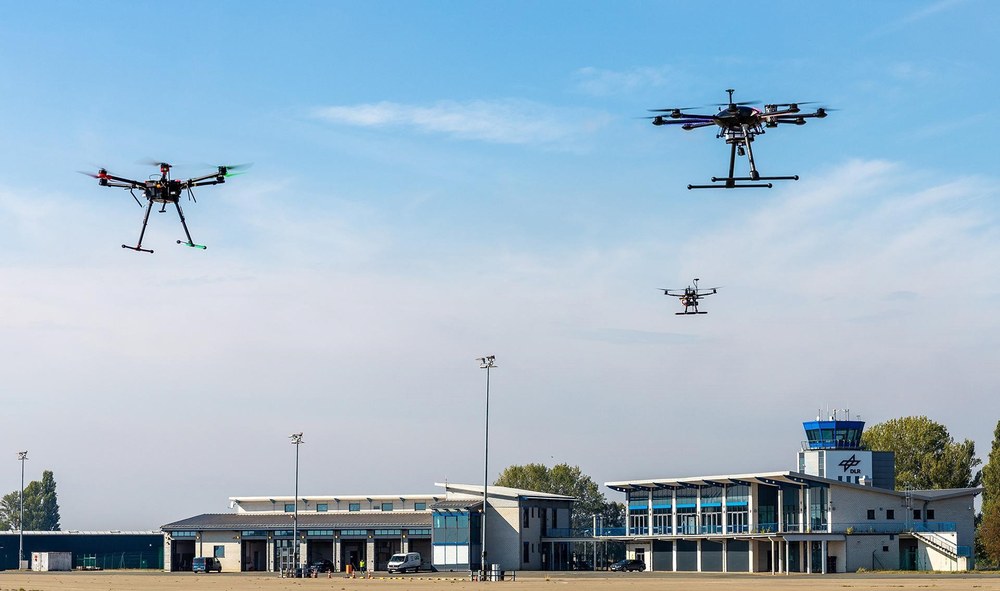DLR expands National Experimental Test Center for Unmanned Aircraft Systems with U-space real-life laboratory


Gorodenkoff – stock.adobe.com
- DLR will set up a U-space real-life laboratory at DLR's Cochstedt site with all relevant U-space services from January 2023.
- The lab will test the interaction between traditional air traffic control, U-space airspace and innovative unmanned applications.
- A U-space virtualisation environment is being developed to transfer findings to other geographical areas.
- Focus: Aeronautics
In the future, there will be more drones in the skies. In order to integrate a large number of them safely and efficiently into the existing air traffic management (ATM) system, research and industry in Europe are working on a uniform EU concept for a drone airspace: the so-called U-space. Developing this will enable forward-looking technologies and services for drones and air taxis, as well as provide geographical areas in which uniform rules and procedures coordinate drone traffic through special services. From January 2023, the German Aerospace Center (Deutsches Zentrum für Luft- und Raumfahrt; DLR) has started setting up a U-space airspace for drones in the form of a real-life laboratory at the National Experimental Test Center for Unmanned Aircraft Systems in Cochstedt at the Magdeburg-Cochstedt commercial airport.
The new U-space Real-life laboratory (Reallab) in Cochstedt will be one of the most comprehensive of its kind in Germany and will encompass all key aspects: the U-space airspace, the necessary infrastructure and a wide range of services. In the European U-space concept, there are four service levels with increasing complexity. Level U1 forms the basis with basic services such as electronic registration and identification of drones. Whereas level U4 includes fully comprehensive services, such as integrated interfaces with crewed aircraft. The Reallab in Cochstedt will cover all four levels, making it the first active commercial airport in Germany to implement and demonstrate the equipment.
Open questions on the design of the European concept
Thanks to new legal framework conditions that have been put in place in January 2023, the implementation of U-space airspaces in principle is now possible. However, even though U-Space has been prepared as a framework, there are currently still a large number of research questions as to how these airspaces, the services and their interaction must be precisely designed. The technical requirements and interfaces for unmanned aircraft to be operated in U-space or the coordination with air traffic control are also still the subject of current research.
"A real U-space airspace at the Test Center in Cochstedt has great added value for our research and that of our partners. With the expansion of the test centre, we can test drone technologies in a realistic U-space environment. We will be able to test and evaluate the diverse, newly developed services here in terms of feasibility, safety and efficiency," says Dagi Geister, Head of the Unmanned Aircraft Systems department at the DLR Institute of Flight Guidance.
For years, DLR and its institutes have been working on numerous projects that address individual issues relating to the integration of unmanned aerial vehicles. The U-space Reallab at the National Test Center will enable researchers to bring together research results into a common overall U-space system, to continuously develop these further and to support the regulatory processes at national and European level.
Replicating other drone areas in Cochstedt
The new U-space rea-life laboratory will provide answers to very different future drone areas, not only to the region around Cochstedt. For this reason, the Reallab will include a virtualisation environment that will allow other geographical regions to be realistically recreated in Cochstedt. In this way, U-space airspaces and services for completely different geographical areas in Germany and Europe can be validated with comparatively little effort. Stakeholders such as urban developers, aviation authorities and residents have the opportunity in the real-life laboratory to experience future mobility in a drone airspace for their regions at an early stage, for example by means of augmented reality, and to use their feedback to influence the design of the new concepts, processes and services.
The U-space real-life laboratory will be set up in Cochstedt as an internal DLR project from January 2023 to December 2026. In addition to the National Experimental Test Center for Unmanned Aircraft Systems, the DLR Institutes of Flight Guidance, Flight Systems, Software Technology, Communications and Navigation, and Aerodynamics and Flow Technology are involved in the project, which has a volume of 7.5 million euros.
